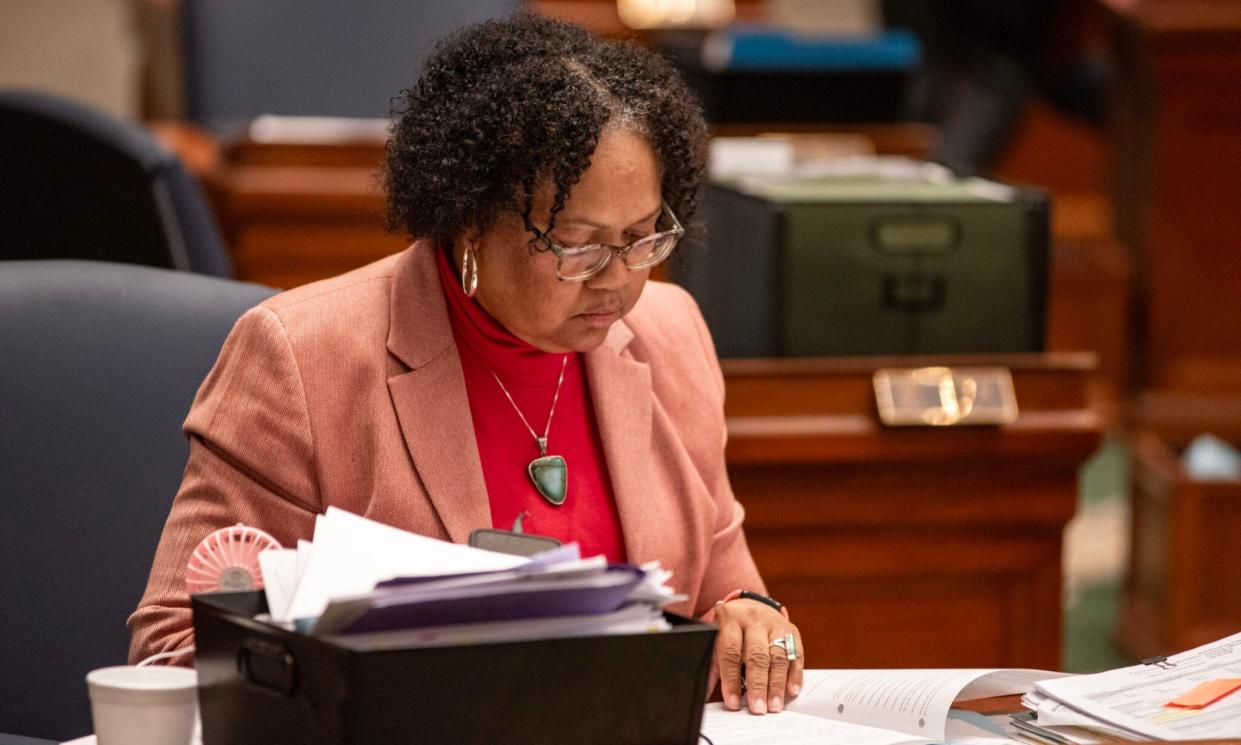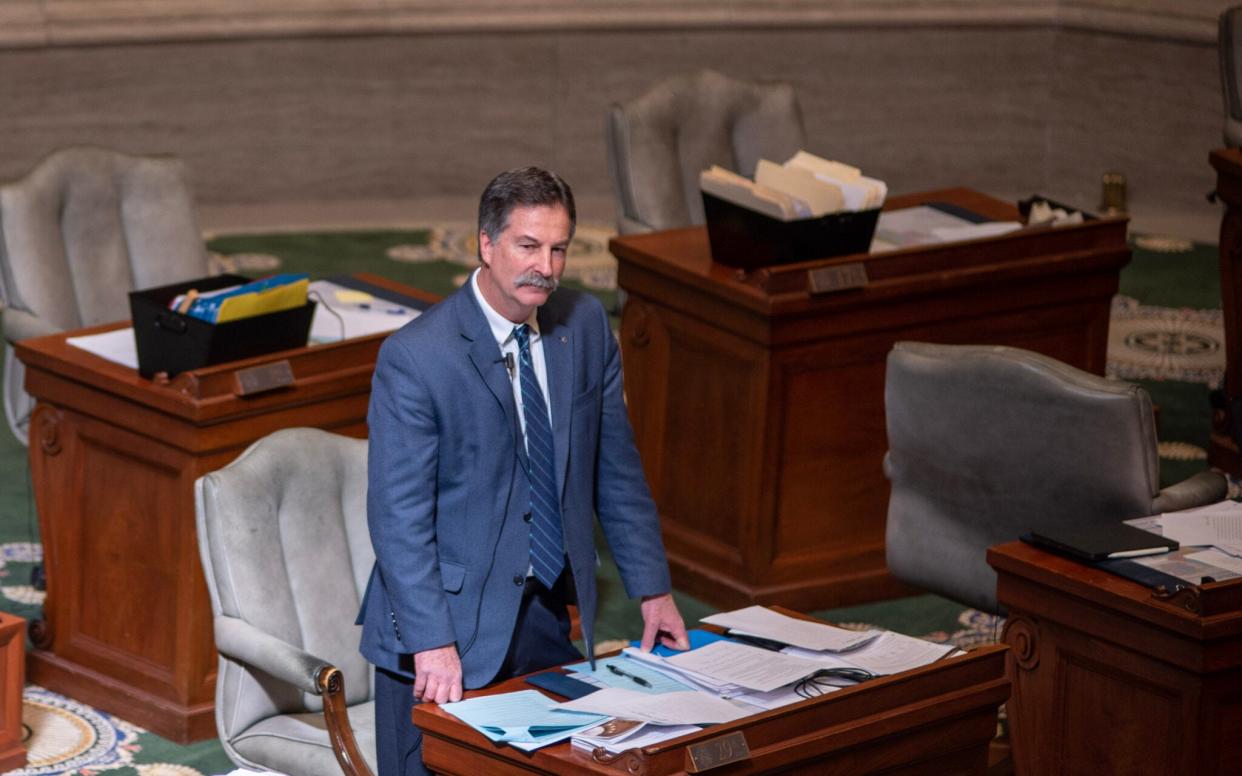Open seats, primary challenges mean Missouri Senate will see most turnover in two decades
This year’s elections will result in some of the biggest changes in Missouri Senate membership since term limits took effect 20 years ago, with at least nine members exiting the chamber and primary challenges that could send four incumbents home.
The Senate, dominated by a Republican supermajority, is beset by GOP factional warfare that has disrupted both this year’s session and those of the past three years. A group that called itself the conservative caucus in 2021 and 2022 before rebranding as the Freedom Caucus, has repeatedly disrupted normal functioning of the Senate.

Filibusters held up approval of a new congressional district map and forced a special session on provider taxes vital to funding Medicaid. This year, the infighting became so bad several Freedom Caucus members lost committee chairmanships.
For the challengers to GOP incumbents, ending those fights is a theme they think will play with voters.
“When we divide into sub-caucuses, it hurts the conservative agenda,” said state Rep. Mike Haffner of Pleasant Hill, who is challenging state Sen. Rick Brattin in the 21st District. “I belong to the conservative party, the Republican Party, and that’s the only group that I will affiliate with.”
With most seats considered safe for one party or the other and only half of the chamber on the ballot, there is little chance Republicans will lose their majority. Three open seats are considered toss-ups, however, and could end the GOP supermajority if Democrats have a good year.
The turnover this year is comparable to what happened when term limits took effect in 2002. Senators can serve two four-year terms, and that year 12 were ineligible to run for re-election. Ten more were barred from new terms in 2004.
Of the nine members leaving the chamber this year, six must exit due to term limits. Among the others, Sen. Elaine Gannon of De Soto is retiring, Sen. Holly Thompson Rehder of Scott City is running for lieutenant governor and state Sen. Karla Eslinger of Wasola will take over as the state’s Commissioner of Education on June 1.
Across the Capitol in the Missouri House, where all the seats are on the ballot, there is a big increase in contested seats compared to two years ago. In the 2022 election, only 69 of 163 districts had both Republican and Democratic candidates. This year, the major parties will both field candidates in 114 districts.
To break the Republican supermajority in the Missouri House, Democrats would have to pick up three seats, which they did in the 2022 elections.
Legislative candidates accounted for 410 of the more than 580 candidates who visited the Secretary of State’s office — some more than once — to put their names on the ballot for posts ranging from circuit judge to governor.
GOP majorities are safe

The reason Republicans seem certain to retain their Senate majority after this year’s election is the seats that aren’t on the ballot. The partisan split in this year’s state Senate elections is seven Democratic seats and 10 Republican. Of the seats not on the ballot, three are held by Democrats and 14 by Republicans.
Every one of the 17 Senate seats on this year’s ballot has a contest. Two, the 13th District in St. Louis County and the 27th District of southeast Missouri, only have a primary.
Until Tuesday, it looked like Democrats would pick up a Republican-held seat with the close of filing. Former state Rep. Stephen Webber of Columbia was unopposed in the 19th District, currently held by Senate President Pro Tem Caleb Rowden, until former state Rep. Chuck Basye filed.
The Senate seats expected to be competitive in November are open because of term limits. Two are currently held by Democrats, State Sen. Lauren Arthur of Kansas City in the 17th District and Senate Minority Leader John Rizzo of Independence in the 11th District.
The third is held by a Republican, state Sen. Andrew Koenig of Manchester in the 15th District. Koenig is a candidate for state treasurer.
The incumbent senators facing primaries include two of the chamber’s most conservative members, Brattin of Harrisonville and Mike Moon of Ash Grove, and two first-term Democrats, Barbara Washington of Kansas City and Angela Moseley of Florissant.
Mosley represents the 13th District and her primary against state Rep. Chantelle Nickson-Clark of Florissant will decide who is sworn in as senator in January.
The Democratic primary in Kansas City’s 9th District will pit Washington against Brandon Ellington, a former state representative and former Kansas City councilman. He’s not running because of any particular beef with Washington, he said, except he thinks he could do more.
“I am not running against the Senator, I’m running for the Senate seat, because we need a senator that’s actually going to fight for the residents of the 9th district and have an understanding of suffering across the state,” Ellington said.
Washington, interviewed outside her Capitol office, said she’s brought millions of dollars home for projects important to her district and pointed to the revitalization of the historic Black business district of 18th and Vine.
“He should look at my record,” she said.
Republican Derron Black of Kansas City will face the winner in November.
Challenging the Freedom Caucus

For Republican incumbents facing a primary, the campaign is opening with heavy criticism from opponents. Challengers said they want to cooperate with GOP leadership in the chamber, not spend days tying the chamber up.
Moon spends too much time obstructing the Senate and too little time working to get his bills passed, said Susan Haralson of Ozark, founder of Premier Home Health Care who has filed to run against Moon in the GOP primary.
Moon represents the 29th District in southwest Missouri.
Moon was a member of the conservative caucus, a group formed in 2021 that also engaged in bitter factional fights, though he is not a formal member of the current iteration of the group called the Freedom Caucus. He often challenges Senate custom, including a 2022 episode when he was punished for wearing overalls on the Senate floor and refusing to apologize for breaking decorum.
“He is truly a nice guy,” Haralson said of Moon. “I just think that he’s a little off base.”
Haralson said she wants the Senate to function as a collegial body, not one where factions disrupt debate.
“I don’t think there’s much that has been accomplished,” she said. “And some of it is because of him.”
In 12 years as a lawmaker, including eight years in the House, Moon has passed one bill, to ban gender-affirming medical treatments for minors. It passed last year.
“That is a significant bill passed that will live on way longer than I’ll be alive, and it’s for the protection of children,” Moon said. “I think that’s a substantial benchmark.”
The 29th district was redrawn after the census to include Christian County, where he has never been on the ballot, and to remove Stone and Taney counties, which he carried in his 2020 primary. Haralson lives in Christian County.
Ron Monnig of Eagle Rock filed Tuesday as the Democratic candidate in the 29th District to face the winner of the Moon-Haralson primary in November.
Brattin’s primary opponents in the 21st District in western Missouri are both currently members of the House: Haffner and Dan Houx of Warrensburg.
Brattin won the primary for his seat in 2020 with 49.6% of the vote and placed second in the 4th Congressional District primary in 2022. He is a member of the Freedom Caucus and lost a committee chairmanship and two vice-chairmanships when Senate leaders lost patience with the caucus’ obstruction tactics.
“It’s sad to me that there are bills that have been in the process over the past three years that died in the last couple of weeks in the Senate that should have passed,” said Houx.
Haffner blames obstruction for the low number of bills passed in recent years.
“Some of the actions that are being taken on the floor are dysfunctional, and it is hurting the opportunity to get the conservative agenda to the governor,” Haffner said.
Brattin had equally sharp words for his opponents.
The 31st District was redrawn after the census, adding Johnson County to Cass and Bates counties and removing Barton, Henry and Vernon counties. That moved Houx out of his previous district, the 21st, represented by Sen. Denny Hoskins of Warrensburg.
“He feels like this is his anointing and it was his rightful office up until redistricting,” Brattin said.
Haffner’s campaign is an example of ingratitude, Brattin said.
“He wouldn’t even be in the position he’s in if it wasn’t for my wife and I to come in and to help him even get elected,” Brattin said. “Now he’s running against us and feels this is his rightful place.”
Raymond James of Leeton is the Democratic candidate who will face the winner in November.
This story was first published at www.missouriindependent.com.
This article originally appeared on Springfield News-Leader: Missouri Senate will see most turnover in two decades in 2024 election
